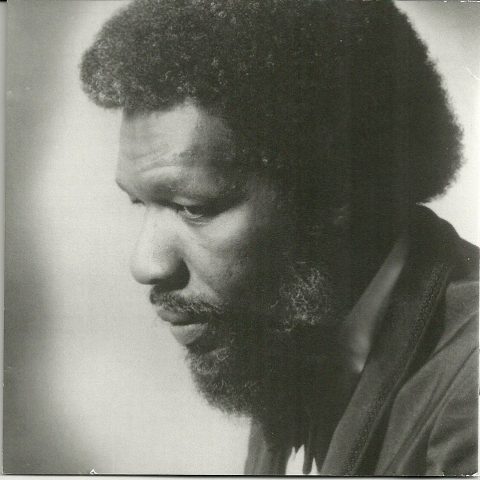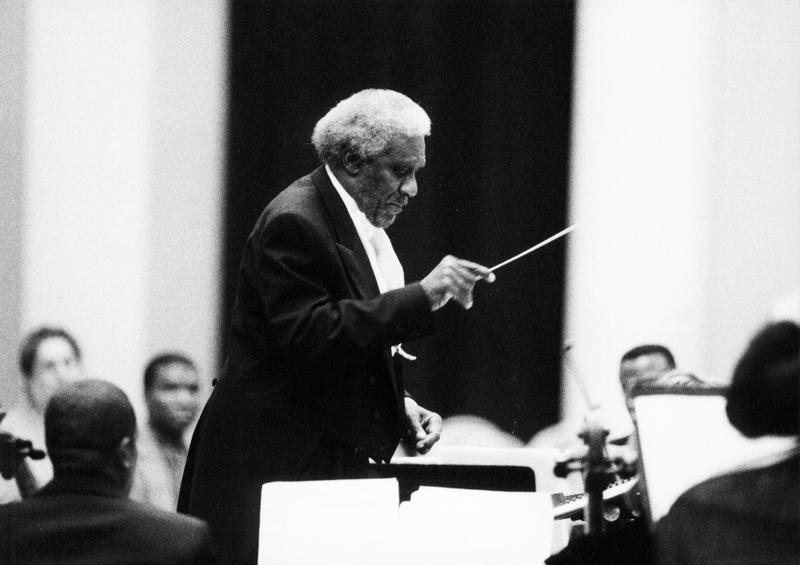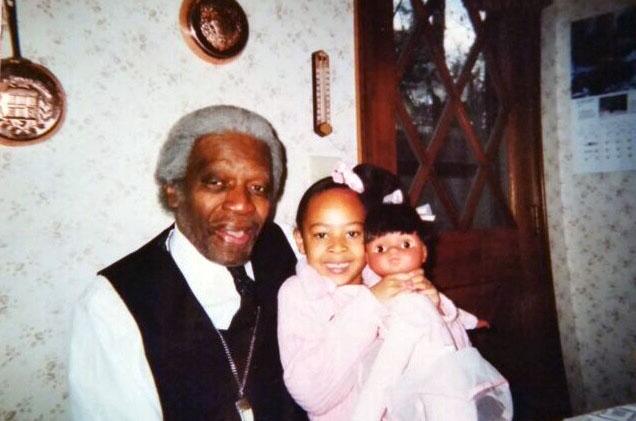
SOUND PROJECTIONS
AN ONLINE QUARTERLY MUSIC MAGAZINE
EDITOR: KOFI NATAMBU
SPRING, 2021
VOLUME TEN NUMBER ONE
CHARLES MINGUSFeaturing the Musics and Aesthetic Visions of:
JEREMY PELT
(April 17-23)
WILLIAM GRANT STILL
(April 24-30)
AMINA CLAUDINE MYERS
(May 1-7)
KARRIEM RIGGINS
(May 8-14)
ETTA JONES
(May 15-21)
YUSEF LATEEF
(May 22-28)
CHRISTIAN SANDS
(May 29—June 4)
E. J. STRICKLAND
(June 5-11)
TAJ MAHAL
(June 12-18)
COLERIDGE-TAYLOR PERKINSON
(June 19-25)
DOM FLEMONS
(June 26-July 2)
HEROES ARE GANG LEADERS
(July 3-July 9)
https://www.blackpast.org/african-american-history/perkinson-coleridge-taylor-1932-2004/
Coleridge-Taylor Perkinson (1932-2004)
Musician, composer, and conductor Coleridge-Taylor Perkinson was born on June 14, 1932, in Manhattan, New York City. Perkinson’s mother, a talented pianist, organist, and theater director in the Bronx, named her son after the Afro-British composer, Samuel Coleridge-Taylor. Perkinson began showing an interest in music at a very young age and in 1945 he began attending New York’s High School of Music and Art. In 1948, he won the prestigious High School Music and Art Choral Competition with his composition titled And Behold. Perkinson graduated from the high school in 1949 and that same year he won the coveted LaGuardia Prize for Music.
After high school, Perkinson attended New York University where he was an education major until 1951, intending to become a public school teacher. In that year, however he decided instead to focus on music and transferred to the Manhattan School of Music where he became a composition major. Perkinson studied under influential figures such as Charles Mills, Vittorio Giannini, and Jonel Perlea. He graduated in 1953 and during the summer of 1954 began taking courses in conducting at the Berkshire Music Center in Massachusetts while at the same time studying under renowned composer Earl Kim at Princeton University. In 1960, Perkinson traveled to Holland, where he spent three years pursuing his studies in conducting under Maestros Dean Dixon and Franco Ferrara at the Netherlands Radio Union at Hilversum.
Perkinson had a long and successful career in the music industry. He worked as a music director and arranger for many famous jazz and soul artists including Marvin Gaye, Barbara McNair, Lou Rawls, Donald Byrd, Max Roach, Melvin Van Peebles, and Harry Belafonte. Perkinson also composed numerous musical scores for the stage, film, and television. He wrote ballet scores for dance companies like Dance Theater of Harlem, Alvin Ailey, and the Pomare Dance Company. He also wrote and conducted the scores for award winning films such as Montgomery to Memphis, a documentary about Martin Luther King Jr., and A Warm December, a film both starring and directed by Sidney Poitier. Perkinson also wrote the theme songs for several hit network television shows including Get Christie Love! and Room 222.
In 1965, Perkinson co-founded the Symphony of the New World, which he
also conducted from 1965 to 1970. In addition to writing and
conducting, Perkinson also held various teaching positions, including a
job at Indiana University from 1997 to 1998. From 1998 until his death
in 2004, he worked as the Coordinator of Performance Activities at
Columbia College Chicago’s Center for Black Music Research.
Coleridge-Taylor Perkinson passed away on March 9, 2004 in Chicago,
Illinois. The year after his death a wide-range compilation of his music
was released on an album titled Coleridge-Taylor Perkinson (1932-2004); A Celebration.

Artists
Coleridge-Taylor Perkinson
ComposerColeridge-Taylor Perkinson (1932–2004) was an innovative American composer whose interests spanned the worlds of jazz, dance, pop, film, television, and classical music.
Coleridge-Taylor Perkinson was principal conductor and Coordinator of Performance Activities at the Center for Black Music Research in Chicago. Mr. Perkinson was one of the nation’s foremost composers and conductors. He studied composition at the Manhattan School of Music and Princeton University; and he studied conducting at the Berkshire Music Center, at the Salzburg Mozarteum, and with Franco Ferrara and Dean Dixon. From 1965 to 1970, he was co-founder and associate conductor for the Symphony of the New World and was its acting music director during the 1972-73 season. He appeared as guest conductor with many orchestras around the world and served as music director for the Alvin Ailey Dance Company, Dance Theatre of Harlem, and for productions at the American Theatre Lab, the Denver Center for the Performing Arts, and the Goodman Theatre. He composed and conducted scores for numerous award-winning theatrical, television, and documentary films.
https://www.wnyc.org/story/no-boundaries-music-life-coleridge-taylor-perkinson-wnyc/

Coleridge-Taylor Perkinson arranged songs for Harry Belafonte and Marvin Gaye. He scored films starring Sydney Poitier, Cisely Tyson and Muhammed Ali. Alvin Ailey and the Dance Theatre of Harlem commissioned his ballet scores. However, Perkinson’s deepest desire was to become a composer and conductor of classical music.
At age 23, his first string quartet was played in Carnegie Hall and a decade later Perkinson co-founded the country’s first fully integrated professional symphony orchestra, the Symphony of the New World.
Tune into 93.9FM and NJPR at 9pm on Sunday, February 22 to hear Terrance McKnight's new one-hour biography highlighting Perkinson's personal life, his diverse compositions and the orchestra he helped found.
Learn more about WNYC's Black History Month programming.
https://www.nytimes.com/2004/03/13/arts/coleridge-taylor-perkinson-versatile-musician-dies-at-71.html
Coleridge-Taylor Perkinson, Versatile Musician, Dies at 71
Coleridge-Taylor Perkinson, a composer, conductor and pianist who combined styles from the classics to jazz to create sonatas, concertos and symphonies as well as scores for movies and television, died on Tuesday in Chicago. He was 71.
The cause was cancer, said Rosita M. Sands, director of the Center for Black Music Research at Columbia College Chicago, where Mr. Perkinson was artistic director of the performance program.
His career took him from the concert halls of Europe to the jazz combo of the drummer Max Roach, and he did arranging for Marvin Gaye, Harry Belafonte and Melvin Van Peebles, among many others.
Mr. Perkinson, known as Perk, was a co-founder and musical director of the Symphony of the New World in New York, and was its acting music director during the 1972-73 season.
At various times he was composer in residence or music director for the Negro Ensemble Company, the Alvin Ailey Dance Company and the Dance Theater of Harlem and for productions of the American Theater Lab, among others. He was guest conductor with many orchestras.
Mr. Perkinson called composition ''written improvisation.'' Bernard Holland wrote in a review in The New York Times in 1988 that his ''String Quartet No. 1'' ''identified with some precision the compatibilities of French impressionism and jazz.''
The International Dictionary of Black Composers says he explored ''the extremities of the sound spectrum,'' using odd metrical signatures and other methods, and notes that he placed ''widely spaced accompaniments against closely woven voices à la Stravinsky.''
Coleridge-Taylor Perkinson was born on June 14, 1932, in Manhattan, and was named for Samuel Coleridge-Taylor, a black British composer and conductor who gained recognition in the 1890's. After graduating from the High School of Music and Art, where he shared the LaGuardia Prize in Music with the soprano Reri Grist, Mr. Perkinson attended New York University.
He then transferred to the Manhattan School of Music, where he earned bachelor's and master's degrees, studying with Hugh Ross, a prominent choral director, who introduced him to Stravinsky and other musical luminaries. Mr. Perkinson also sang as a baritone soloist in New York churches.
He taught at Brooklyn College from 1959 to 1962 and was director of the Brooklyn Community Symphony Orchestra, an affiliate of the school's music department. In the summers he studied orchestral conducting at the Mozarteum in Salzburg. In the mid-1960's he played in the Max Roach Quartet and later worked with Mr. Roach as an arranger and conductor.
His film scores include ''A Warm December,'' a 1973 movie starring and directed by Sidney Poitier. His classical compositions have been recorded by the Chicago Sinfonietta, the flutist Harold Jones and others.
In a 1973 review in The Times John Rockwell described Mr. Perkinson at the podium, a ''tall, brooding man, he conducts economically and persuasively.''
Mr. Perkinson is survived by his daughter, Joettè Thompson, of Kansas City, Mo.; his sister, Beverly Perkinson Thomas of Houston; and two grandchildren.

Coleridge-Taylor Perkinson
(1932-2004)
Perkinson was named after Samuel Coleridge-Taylor and to some extent, followed in Coleridge-Taylor’s footsteps by becoming an accomplished composer and teacher himself. He studied at various schools around New York and New Jersey, including the Manhattan School of Music and Princeton, before teaching at Brooklyn College and studying conducting in Austria and the Netherlands. As well as composing orchestral works, he also arranged music for Marvin Gaye, composed music for films such as Montgomery to Memphis (1970) and a ballet called For Bird, With Love, inspired by saxophonist Charlie Parker. He co-founded the Symphony of the New World, and even had the time to perform with the Max Roach quartet in 1964. In 2006, a music critic wrote that Perkinson’s Sinfonietta No.1 for Strings (1955) “…might have been considered, if composed by a young Caucasian, the work of a wunderkind”.
Further reading: https://chevalierdesaintgeorges.homestead.com/Perkinson.html
Listen to Coleridge-Taylor Perkinson on Spotify
https://en.wikipedia.org/wiki/Coleridge-Taylor_Perkinson
Coleridge-Taylor Perkinson
Coleridge-Taylor Perkinson (June 14, 1932, Manhattan, New York City or possibly (unconfirmed) Winston-Salem, North Carolina – March 9, 2004, Chicago) was an innovative American composer whose interests spanned the worlds of jazz, dance, pop, film, television, and classical music.
Coleridge-Taylor Perkinson was Afro-American. He was named after Afro-British composer Samuel Coleridge-Taylor (1875–1912). Perkinson's mother was active in music and the arts as a piano teacher, church organist, and director of a theater company.[1]
Perkinson attended the High School of Music and Art in New York City. After graduating from high school, he attended New York University. He later transferred to the Manhattan School of Music, where he studied composition with Vittorio Giannini and Charles Mills. He received bachelor's and master's degrees from the Manhattan School of Music.[2] He also studied with Earl Kim at Princeton University. He was on the faculty of Brooklyn College (1959–1962) and studied conducting in the summers of 1960, 1962, and 1963 in the Netherlands with Franco Ferrara and Dean Dixon and also learned conducting in 1960 at the Mozarteum in Salzburg.
Perkinson cofounded the Symphony of the New World in New York in 1965 and later became its Music Director. He was also Music Director of Jerome Robbins's American Theater Lab and the Alvin Ailey American Dance Theater. Perkinson composed a ballet for Ailey entitled For Bird, With Love inspired by the music of jazz great Charlie Parker.[1]
Perkinson wrote a great deal of classical music, but was equally well-versed in jazz and popular music. He served briefly as pianist for drummer Max Roach’s quartet and wrote arrangements for Roach, Marvin Gaye, and Harry Belafonte. He also composed music for films such as The McMasters (1970), Together for Days (1972), A Warm December (1973), Thomasine & Bushrod (1974), The Education of Sonny Carson (1974), Amazing Grace (1974), Mean Johnny Barrows (1976), and the documentary Montgomery to Memphis (1970) about Martin Luther King Jr. In 1970 he wrote incidental music for at least one episode of the US television show Room 222.
Perkinson's music has a blend of Baroque counterpoint; American Romanticism; elements of the blues, spirituals, and black folk music; and rhythmic ingenuity.
Orchestral works
- Grass: Poem for Piano, Strings and Percussion (1973)
- Mop/Mop: A Symphonic Sketch (1998)
- Sinfonietta No. 1 for Strings (1953)
- Sinfonietta No. 2 for Strings: Generations (1996)
- Worship: A Concert Overture (2001)
Choral works
- Fredome/ Freedom for SATB Chorus and Piano (1970)
- Fredome/ Freedom for SATB Chorus, Two Pianos, Double Bass and Percussion (1970)
- Psalm Twenty-Three (2003)
Solo and instrumental works
- 60/60 for Flute, Clarinet, Trumpet and Piano (1996)
- Blue/s Forms for solo violin (1979)
- Finale for solo clarinet (unspec.)
- Lament for viola and piano (1950s)
- Lamentations Black/Folk Song Suite for solo cello (1973)[3]
- Lil' Lite O' Mine/ Sparklin' for Flute and Piano (2000)
- Louisiana Blues Strut: A Cakewalk for violin (2002)
- Scherzo for solo piano (1973)
- Sonata a' la Baroque for solo flute (1994)
- Sonata for Flute & Piano (2003)
- String Quartet No. 1 "Calvary" (1956)
- Toccata for solo piano (1953)
- Walkin' All Over God's City Called Heaven for violin and cello (1996)
External links
- Coleridge-Taylor Perkinson papers, the composer's personal papers in the Music Division of The New York Public Library for the Performing Arts.
- Obituary
- Short biography from the New York Public Library
- Photo of Perkinson at Find a Grave
- http://www.wnyc.org/story/no-boundaries-music-life-coleridge-taylor-perkinson-wnyc/
- http://chevalierdesaintgeorges.homestead.com/Perkinson.html
https://www.cedillerecords.org/albums/coleridge-taylor-perkinson-a-celebration/
Coleridge-Taylor Perkinson: A Celebration
Chicago Sinfonietta, Paul Freeman
Coleridge-Taylor Perkinson, Sanford Allen, Tahirah Whittington, New Black Music Repertory Ensemble
This CD celebrates the life of innovative American composer Coleridge-Taylor Perkinson (1932-2004), whose accomplishments spanned the worlds of jazz, dance, pop, film, television, and classical music.
World premiere recordings of Perkinson’s orchestral, chamber, and solo instrumental works showcase his distinctive blend of Baroque counterpoint; energetic, streamlined American Romanticism; elements of blues, spirituals, and black folk music; and a rhythmic ingenuity all his own.
Performances by the Chicago Sinfonietta and conductor Paul Freeman, Chicago’s New Black Repertory Ensemble Quartet, and distinguished soloists.
https://nmbx.newmusicusa.org/OBITUARY-ColeridgeTaylor-Perkinson-19322004/
OBITUARY: Coleridge-Taylor Perkinson, 1932-2004
|
The Center for Black Music Research of Columbia College in Chicago reports that Coleridge-Taylor Perkinson passed away on March 9, 2004, of cancer. He had served the Center since 1998 as its Artistic Director, Performance Program.
Perkinson was born in New York in 1932. After graduating from New York’s High School for Music and Art he studied composition at the
Manhattan School of Music, receiving his bachelor’s degree in music in 1953 and a master’s degree in composition in 1954. He later studied conducting at the Berkshire Music Center, at the Salzburg Mozarteum, and with Franco Ferrara and Dean Dixon. From 1965 to 1970, he was co-founder and associate conductor for the Symphony of the New World and served as its acting music director during the 1972-73 season. At various times in his career he also served as music director or composer-in-residence for the Negro Ensemble Company, the Alvin Ailey Dance Company, the Dance Theatre of Harlem, and for productions at the American Theatre Lab, the Denver Center for the Performing Arts, and the Goodman Theatre. At the time of his death he was also composer-in-residence for the Ritz Chamber Players of Jacksonville, Florida.
Perkinson’s composing career began in high school, when his composition, And Behold, won the High School for Music and Art choral competition in 1948. His career demonstrates his versatility as a composer of classical music, popular music, theater and film music, and jazz. He composed and arranged for a variety of jazz and popular artists including Harry Belafonte, Donald Byrd, and Marvin Gaye (for whom he arranged Gaye’s first platinum album, I Want You, issued in 1976 on the Motown label). He served as pianist for the Max Roach Jazz Quartet in 1964-65. He composed and conducted scores for a number of award-winning theatrical, television, and documentary and feature films, including A Warm December, starring Sidney Poitier (1972). He also served as guest conductor for numerous orchestras all over the world. His classical compositions have been recorded by the Chicago Sinfonietta, the Moravian Philharmonic Orchestra, flutist Harold Jones, pianists John Cheek and Karen Walwyn, and cellist Anthony Elliott.
At the Center for Black Music Research, Perkinson was artistic advisor to Ensemble Stop-Time, the Center’s grant-funded ensemble formed to explore the commonalities between the various black vernacular music forms, including jazz and gospel. In 1999, he began his tenure as conductor and music director of the New Black Music Repertory Ensemble, a group of musicians dedicated to performing a spectrum of music by black composers, from popular music and jazz to concert music. The Ensemble staged a successful series of 34 concerts in Chicago, at the South Shore Cultural Center, Buntrock Hall of Symphony Center, and other venues. The Ensemble also performed for members of congress in Washington, D.C. and in New York City. In 2001, he conducted the Ensemble’s world-premiere concert performance of Doxology: The Doxy Canticles, an opera with libretto by Paul Carter Harrison and music by Wendell Logan.
Survivors include a daughter, Joetté Thompson, a son-in-law, Henry Allen Thompson, and two grandchildren, LaFrance T. Smith III (Trey) and Skylar Thompson, all of Kansas City, Missouri; a sister, Beverly Perkinson Thomas, two nieces, Monica and Michelle Thomas, and one nephew, Curtis Thomas, all of Houston, Texas; cousins; other family members; and a host of friends.
Funeral arrangements are pending.
Courtesy of the Center for Black Music Research of Columbia College









